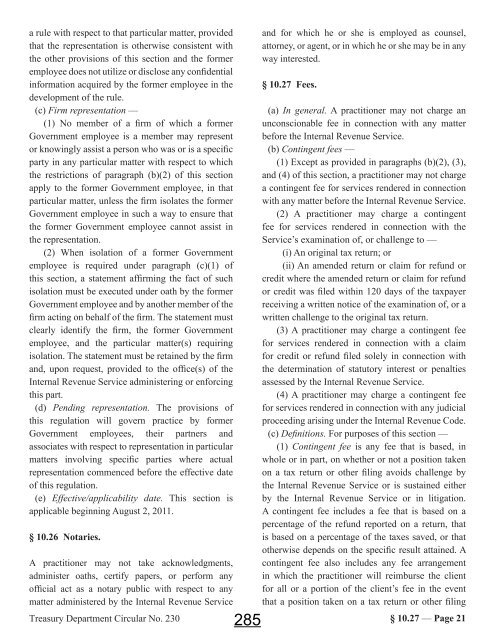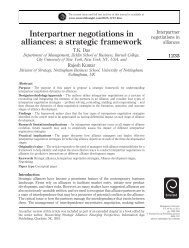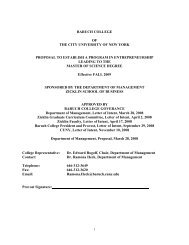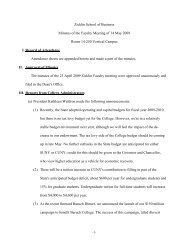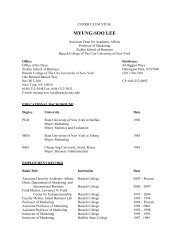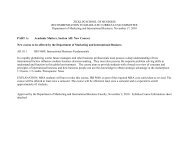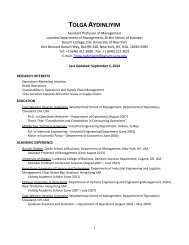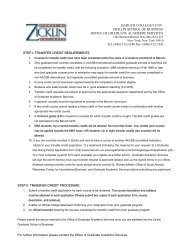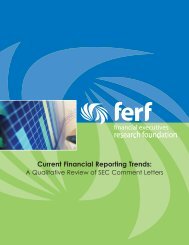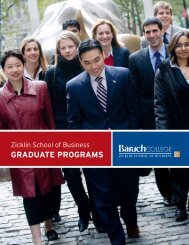Tax Seminar #3 – December 3 2012
Workbook - Zicklin School of Business
Workbook - Zicklin School of Business
You also want an ePaper? Increase the reach of your titles
YUMPU automatically turns print PDFs into web optimized ePapers that Google loves.
a rule with respect to that particular matter, provided<br />
that the representation is otherwise consistent with<br />
the other provisions of this section and the former<br />
employee does not utilize or disclose any confidential<br />
information acquired by the former employee in the<br />
development of the rule.<br />
(c) Firm representation —<br />
(1) No member of a firm of which a former<br />
Government employee is a member may represent<br />
or knowingly assist a person who was or is a specific<br />
party in any particular matter with respect to which<br />
the restrictions of paragraph (b)(2) of this section<br />
apply to the former Government employee, in that<br />
particular matter, unless the firm isolates the former<br />
Government employee in such a way to ensure that<br />
the former Government employee cannot assist in<br />
the representation.<br />
(2) When isolation of a former Government<br />
employee is required under paragraph (c)(1) of<br />
this section, a statement affirming the fact of such<br />
isolation must be executed under oath by the former<br />
Government employee and by another member of the<br />
firm acting on behalf of the firm. The statement must<br />
clearly identify the firm, the former Government<br />
employee, and the particular matter(s) requiring<br />
isolation. The statement must be retained by the firm<br />
and, upon request, provided to the office(s) of the<br />
Internal Revenue Service administering or enforcing<br />
this part.<br />
(d) Pending representation. The provisions of<br />
this regulation will govern practice by former<br />
Government employees, their partners and<br />
associates with respect to representation in particular<br />
matters involving specific parties where actual<br />
representation commenced before the effective date<br />
of this regulation.<br />
(e) Effective/applicability date. This section is<br />
applicable beginning August 2, 2011.<br />
§ 10.26 Notaries.<br />
A practitioner may not take acknowledgments,<br />
administer oaths, certify papers, or perform any<br />
official act as a notary public with respect to any<br />
matter administered by the Internal Revenue Service<br />
Treasury Department Circular No. 230<br />
285<br />
and for which he or she is employed as counsel,<br />
attorney, or agent, or in which he or she may be in any<br />
way interested.<br />
§ 10.27 Fees.<br />
(a) In general. A practitioner may not charge an<br />
unconscionable fee in connection with any matter<br />
before the Internal Revenue Service.<br />
(b) Contingent fees —<br />
(1) Except as provided in paragraphs (b)(2), (3),<br />
and (4) of this section, a practitioner may not charge<br />
a contingent fee for services rendered in connection<br />
with any matter before the Internal Revenue Service.<br />
(2) A practitioner may charge a contingent<br />
fee for services rendered in connection with the<br />
Service’s examination of, or challenge to —<br />
(i) An original tax return; or<br />
(ii) An amended return or claim for refund or<br />
credit where the amended return or claim for refund<br />
or credit was filed within 120 days of the taxpayer<br />
receiving a written notice of the examination of, or a<br />
written challenge to the original tax return.<br />
(3) A practitioner may charge a contingent fee<br />
for services rendered in connection with a claim<br />
for credit or refund filed solely in connection with<br />
the determination of statutory interest or penalties<br />
assessed by the Internal Revenue Service.<br />
(4) A practitioner may charge a contingent fee<br />
for services rendered in connection with any judicial<br />
proceeding arising under the Internal Revenue Code.<br />
(c) Definitions. For purposes of this section —<br />
(1) Contingent fee is any fee that is based, in<br />
whole or in part, on whether or not a position taken<br />
on a tax return or other filing avoids challenge by<br />
the Internal Revenue Service or is sustained either<br />
by the Internal Revenue Service or in litigation.<br />
A contingent fee includes a fee that is based on a<br />
percentage of the refund reported on a return, that<br />
is based on a percentage of the taxes saved, or that<br />
otherwise depends on the specific result attained. A<br />
contingent fee also includes any fee arrangement<br />
in which the practitioner will reimburse the client<br />
for all or a portion of the client’s fee in the event<br />
that a position taken on a tax return or other filing<br />
§ 10.27 — Page 21


